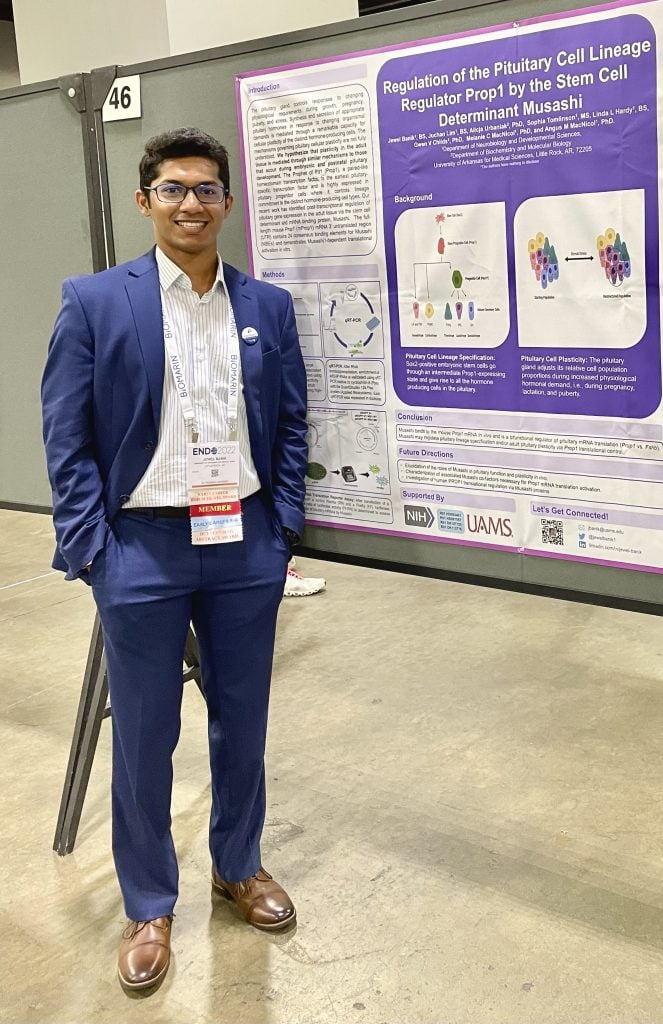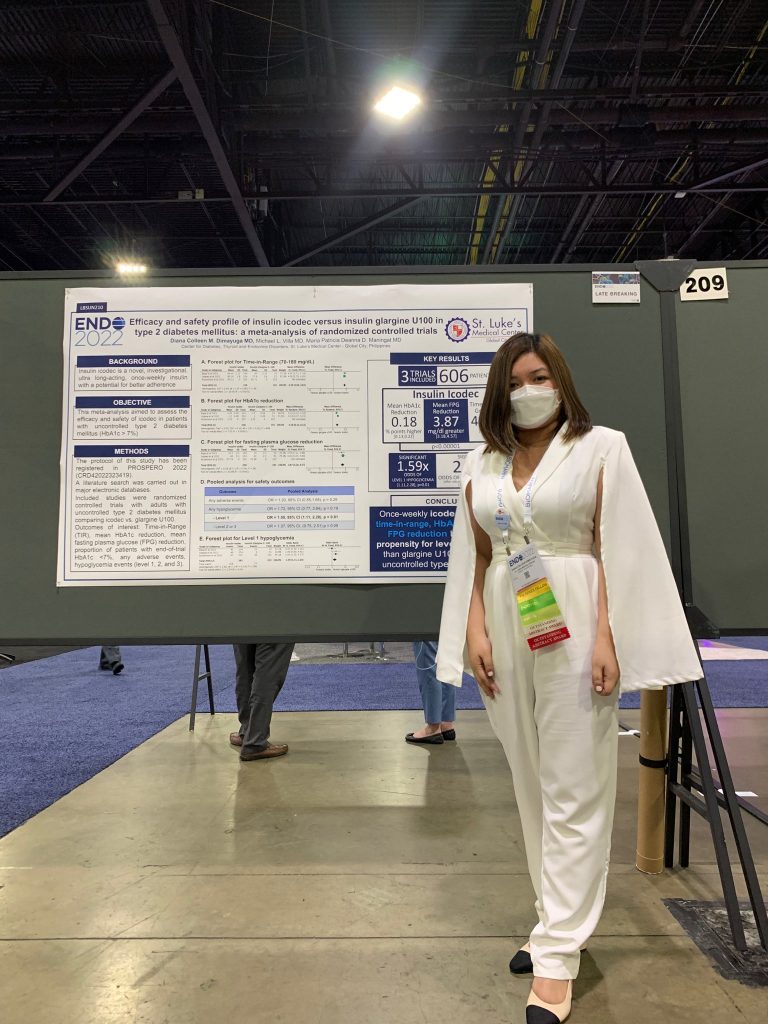For first-time attendees, presenting research at an international conference such as ENDO 2023 can be a little intimidating. Early-career members Diana M. Dimayuga, MD, and PhD candidate Jewel Banik share what they learned when they presented their research last year at ENDO 2022 in Atlanta.
Soon after Diana M. Dimayuga, MD, submitted her late-breaking meta-analysis abstract about using icodec insulin to treat type 2 diabetes, she won an invitation to present her work at ENDO 2022 conference in Atlanta, Ga., last June. That year, the annual conference returned in person for the first time since the COVID-19 pandemic began — and included a virtual component for a hybrid conference experience.
While excited for the opportunity, Dimayuga was also concerned about travelling from the Philippines, where she is an endocrinology fellow at St. Luke’s Medical Center in Global City, to the United States. “At first, I had qualms of not being able to present in person, given the long distance and financial challenges,” she says. But after earning a travel award from the Endocrine Society and support from her institution, Dimayuga attended the live conference.
To get ready, she searched online for poster presentation tips and assembled the poster with PowerPoint. She then printed her work in the Philippines, and then carried it in a cardboard tube while traveling. But “despite preparing well beforehand, I found a nasty little typo in my printed poster when I arrived at ENDO,” she says. “I was grateful there was a print shop at the convention center — fixing it was quite the rush. By some twist of fate, the poster they printed was much larger than the one I paid for.”

Ultimately, she presented her research at a poster meet and greet session and explained how the once-weekly dose of icodec insulin could “revolutionize diabetes management by improving patient adherence,” she says. “The attendees were receptive and interested in the details of our study. I got comments that my poster and presentation were effective and easy to understand. It was a great boost to my confidence and overall, the experience was very fulfilling.”
“Younger endocrinologists on the fence should definitely take the plunge and submit their work. There will be challenges — even unexpected ones — but there will always be people willing to help you out. It will all be worth it in the end.”
Diana Dimayuga, MD, endocrinology fellow, St. Luke’s Medical Center, Global City, Philippines
While putting your research “out there” for public consumption can often be a nerve-wracking experience, but those who have done it all say that it is worth it. The opportunities to learn more about the endocrinology field, to meet others at all stages of their careers, and to gain professional skills and confidence — are all benefits.
Mingling and Meeting Peers
Interacting with others is one of the conference’s biggest benefits, Dimayuga says. “Beyond the honor of recognition for my work, it was a chance to network and find opportunities for training and collaboration.”
Others agree. Jewel Banik, a graduate research assistant and a PhD candidate in the Department of Neurobiology and Developmental Sciences at the University of Arkansas for Medical Sciences, presented an abstract about how plasticity in adult tissue is mediated through similar mechanisms that occur during embryonic and postnatal pituitary development. He received an Outstanding Abstract Award at ENDO 2022 and discussed his work in a five-minute Rapid-Fire presentation two days before appearing in a two-hour Poster Hall meet and greet session.
“I was excited to present my research in person at an international conference for the very first time, but I was a bit nervous because I had to present it in front of some of the best and leading scientists in the field,” he says. His Rapid-Fire presentation went well. Two days later, at the Poster session, he welcomed a range of attendees from first timers like himself to emeritus professors, all of whom gave him feedback and asked questions. Some questions have helped inform future research projects and approaches, he says.
Modeling Resilience
Attending a professional conference like ENDO 2023 to present research can also help foster flexibility. Being able to pivot quickly, as Dimayuga did when she reprinted her poster on a deadline, helped her later appreciate the insights she gained from endocrine experts who learned about her work, knowing they saw it typo-free. “As a fellow-in-training, it was a great opportunity for me to hear feedback from the leaders in the field,” she says.
Seeking audience feedback will “always enrich our work,” Banik says. “At the same time, some scientists will ask tough questions which we are not prepared for or anticipate. It is okay not to know the answer to every question. That’s why we do science.”
Advice for First Time Presenters
“It’s tough to present every part of your research in a single talk or a poster, so it’s sufficient to cover only a part of your research story,” Banik says.
“I divided my whole research into multiple projects and considered each as a block for the entire picture of my research,” he explains. “Each project had its independent hypothesis that contributes to my central hypothesis. So, in presenting research at a conference, I [choose] an independent project that has a strong hypothesis with sufficient background knowledge, followed by experimental plans to test that hypothesis. Then I report my results, conclusion, and future directions. Keeping my poster and presentation in this order helped me actively engage with my audience,” he says.

Still not sure if you should submit your research for consideration? Just do it, Dimayuga says. “Younger endocrinologists on the fence should definitely take the plunge and submit their work,” she says. “There will be challenges — even unexpected ones — but there will always be people willing to help you out. It will all be worth it in the end.”
Other ways to interact include attending Special Interest Group (SIG) meetings that help connect young researchers to leading scientists and experts, Banik says. “These gatherings are the best for making a one-to-one professional connection.”
Finally, explore the host city, especially in the evenings as the days are so busy. “Group dinners and wandering around the city with colleagues and friends are the best experiences to make the conference memorable,” he says.
“I was excited to present my research in person at an international conference for the very first time, but I was a bit nervous because I had to present it in front of some of the best and leading scientists in the field.”
Jewel Banik, graduate research assistant and PhD candidate, Department of Neurobiology and Developmental Sciences, University of Arkansas for Medical Sciences, Little Rock, Arkansas
Being able to interact with endocrinologists at all levels, and the potential for opportunity as you present your research, makes attending conferences like ENDO 2023 very much worth your time. “ENDO draws scientists from every corner of the world and provides a platform to connect,” Banik says. “Jump into any conversation around you and participate.” In doing so, you may just find your next collaborator, colleague, or mentor.
Alkon is a Massachusetts-based freelance writer who is the author of the book, Balancing Pregnancy with Pre-Existing Diabetes: Healthy Mom, Healthy Baby. She’s covered a variety of topics in Endocrine News from best practices for attending a virtual conference to methods to overcome imposter syndrome.

